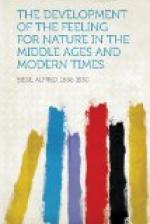As all the world is cheered by the sun,
So I by that; it is my day, my life.
(Richard
III.)
So sweet a kiss the golden sun gives not
To those fresh morning drops upon the rose,
As thy eye-beams, when their fresh rays have smote
The night of dew that on my cheek down flows;
Nor shines the silver moon one half so bright
Through the transparent bosom of the deep.
As doth thy face through tears of mine give light;
Thou shinest on every tear that I do weep.
(Love’s Labour’s Lost.)
This is modern down to its finest detail, and much richer in individuality than the most famous comparisons of the same kind in antiquity.
Sea and stream are used:
Like an unseasonable stormy day
Which makes the silver rivers drown their shores
As if the world were all dissolved to tears,
So high above his limits swells the rage
Of Bolingbroke. (Richard II.)
The current that with gentle murmur glides,
Thou know’st, being stopped, impatiently
doth rage;
But when his fair course is not hindered,
He makes sweet music with the enamell’d
stones,
Giving a gentle kiss to every sedge
He overtaketh on his pilgrimage;
And so by many winding nooks he strays
With willing sport to the wild ocean.
Then let me go, and hinder not my course.
(Two
Gentlemen of Verona.)
Faster than spring-time showers comes thought on thought.
You are the fount that makes small brooks to flow.
And what is Edward but a ruthless sea?
(Henry VI.)
If there were reason for these miseries,
Then into limits could I bind my woes;
When heaven doth weep, doth not the earth o’er-flow?
If the winds rage, doth not the sea wax mad,
Threatening the welkin with his big-swoln face?
And wilt thou have a reason for this coil?
I am the sea: hark, how her sighs do blow!
She is the weeping welkin, I the earth;
Then must my sea be moved with her sighs;
Then must my earth with her continual tears
Become a deluge, overflow’d and drowned.
(Titus Andronicus.)
This battle fares like to the morning’s
war
When dying clouds contend with growing
light,
What time the shepherd blowing of his
nails
Can neither call it perfect day nor night.
Now sways it this way, like a mighty sea
Forced by the tide to combat with the
wind;
Now sways it that way, like the self-same
sea
Forced to retire by fury of the wind.
Sometime the flood prevails and then the
wind:
Now one the better, then another best;
Both tugging to be victors, breast to
breast,
Yet neither conqueror nor conquered.
So is the equal poise of this fell war.
(Henry
VI.)




